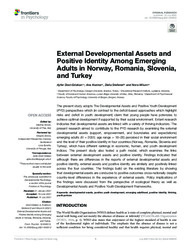External developmental assets and positive identity among emerging adults in Norway, Romania, Slovenia, and Turkey
| dc.contributor.author | Gözkan, Ayfer Dost | |
| dc.contributor.author | Kozina, A. | |
| dc.contributor.author | Stefenel, D. | |
| dc.contributor.author | Wiium, N. | |
| dc.date.accessioned | 2023-04-18T06:31:43Z | |
| dc.date.available | 2023-04-18T06:31:43Z | |
| dc.date.issued | 2021-07-14 | |
| dc.identifier.issn | 1664-1078 | en_US |
| dc.identifier.uri | http://hdl.handle.net/10679/8117 | |
| dc.identifier.uri | https://www.frontiersin.org/articles/10.3389/fpsyg.2021.656972/full | |
| dc.description.abstract | The present study adopts The Developmental Assets and Positive Youth Development (PYD) perspectives which (in contrast to the deficit-based approaches which highlight risks and deficit in youth development) claim that young people have potencies to achieve optimal development if supported by their social environment. Extant research indicates that developmental assets are linked with a variety of thriving indicators. The present research aimed to contribute to the PYD research by examining the external developmental assets (support, empowerment, and boundaries and expectations) emerging adults (N = 2055; age range = 18–28) perceived in their social environment and the level of their positive identity in four countries (Norway, Romania, Slovenia and Turkey), which have different rankings in economic, human, and youth development indices. The present study also tested a path model, which examines the links between external development assets and positive identity. Findings indicated that although there are differences in the reports of external developmental assets and positive identity, external assets and positive identity are similarly and positively linked across the four countries. The findings build on the existing literature by showing that developmental assets are conducive to positive outcomes cross-nationally despite country-level differences in the experience of external assets. Policy implications of the findings were discussed from the perspective of ecological theory as well as Developmental Assets and Positive Youth Development Frameworks. | en_US |
| dc.description.sponsorship | University of Bergen, Norway ; Slovenian Research Agency - Slovenia ; Lucian Blaga University of Sibiu & Hasso Plattner Foundation | |
| dc.language.iso | eng | en_US |
| dc.publisher | Frontiers Media | en_US |
| dc.relation.ispartof | Frontiers in Psychology | |
| dc.rights | openAccess | |
| dc.rights.uri | https://creativecommons.org/licenses/by/4.0/ | |
| dc.title | External developmental assets and positive identity among emerging adults in Norway, Romania, Slovenia, and Turkey | en_US |
| dc.type | Article | en_US |
| dc.description.version | Publisher version | |
| dc.peerreviewed | yes | en_US |
| dc.publicationstatus | Published | en_US |
| dc.contributor.department | Özyeğin University | |
| dc.contributor.authorID | (ORCID 0000-0002-1587-4371 & YÖK ID 124621) Dost, Ayfer | |
| dc.contributor.ozuauthor | Gözkan, Ayfer Dost | |
| dc.identifier.volume | 12 | en_US |
| dc.identifier.wos | WOS:000678614700001 | |
| dc.identifier.doi | 10.3389/fpsyg.2021.656972 | en_US |
| dc.subject.keywords | Developmental assets | en_US |
| dc.subject.keywords | Emerging adulthood | en_US |
| dc.subject.keywords | Positive identity | en_US |
| dc.subject.keywords | Positive youth development | en_US |
| dc.subject.keywords | Thriving | en_US |
| dc.subject.keywords | Youth policies | en_US |
| dc.identifier.scopus | SCOPUS:2-s2.0-85111410690 | |
| dc.relation.publicationcategory | Article - International Refereed Journal - Institutional Academic Staff |
Files in this item
This item appears in the following Collection(s)
Share this page




